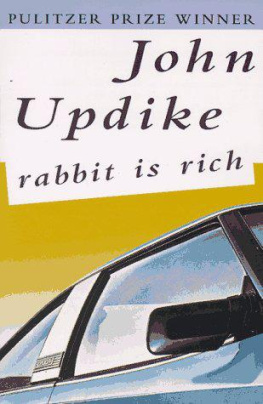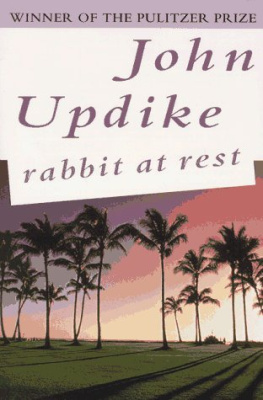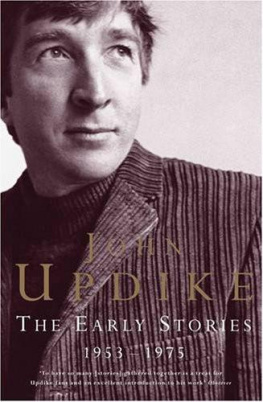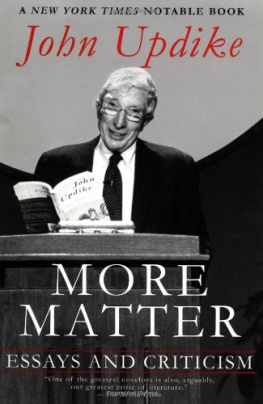John Updike - The Maples Stories
Here you can read online John Updike - The Maples Stories full text of the book (entire story) in english for free. Download pdf and epub, get meaning, cover and reviews about this ebook. year: 2009, publisher: Alfred A. Knopf, genre: Computer. Description of the work, (preface) as well as reviews are available. Best literature library LitArk.com created for fans of good reading and offers a wide selection of genres:
Romance novel
Science fiction
Adventure
Detective
Science
History
Home and family
Prose
Art
Politics
Computer
Non-fiction
Religion
Business
Children
Humor
Choose a favorite category and find really read worthwhile books. Enjoy immersion in the world of imagination, feel the emotions of the characters or learn something new for yourself, make an fascinating discovery.

- Book:The Maples Stories
- Author:
- Publisher:Alfred A. Knopf
- Genre:
- Year:2009
- Rating:4 / 5
- Favourites:Add to favourites
- Your mark:
- 80
- 1
- 2
- 3
- 4
- 5
The Maples Stories: summary, description and annotation
We offer to read an annotation, description, summary or preface (depends on what the author of the book "The Maples Stories" wrote himself). If you haven't found the necessary information about the book — write in the comments, we will try to find it.
The Maples Stories — read online for free the complete book (whole text) full work
Below is the text of the book, divided by pages. System saving the place of the last page read, allows you to conveniently read the book "The Maples Stories" online for free, without having to search again every time where you left off. Put a bookmark, and you can go to the page where you finished reading at any time.
Font size:
Interval:
Bookmark:


THE MAPLES PRESENTED themselves to the writer in New York City in 1956, dropped from his sight for seven years, and reappeared in the suburbs of Boston in 1963, giving blood. They figured in a dozen stories since, until the couples divorce in 1976. Their name, bestowed by a young man who had grown up in a small town shaded by Norway maples, and who then moved to the New England of sugar maples and flame-bright swamp maples, retained for him an arboreal innocence, a straightforward and cooling leafiness. Though the Maples stories trace the decline and fall of a marriage, they also illumine a history in many ways happy, of growing children and a million mundane moments shared. That a marriage ends is less than ideal; but all things end under heaven, and if temporality is held to be invalidating, then nothing real succeeds. The moral of these stories is that all blessings are mixed. Also, that people are incorrigibly themselves. The musical pattern, the advance and retreat, of the Maples duet is repeated over and over, ever more harshly transposed. They are shy, cheerful, and dissatisfied. They like one another, and are mysteries to one another. One of them is usually feeling slightly unwell, and the seesaw of their erotic interest rarely balances. Yet they talk, more easily than any other characters the author has acted as agent for. A tribe segregated in a valley develops an accent, then a dialect, and then a language all its own; so does a couple. Let this collection preserve one particular dead tongue, no easier to parse than Latin. To the fourteen Maples stories I have added two that from the internal evidence appear to take place in Richard Maples mind, and a fragment that cried off completion.
*
In the thirty years since the above preface was written, this collection of linked stories, quickly assembled to coincide with a made-for-television movie called Too Far to Go, has had a gratifying career in paperback: in England as a Penguin book titled Your Lover Just Called, and in translations into, by my reckoning, German, French, Spanish, Dutch, Serbian, Japanese, and Hebrew. Some of the German editions of Der weite Weg zu zweit were in hardcover, but this is the first hardbound edition in English. I was delighted to be told of it, and have availed myself of the opportunity to revise a few words and phrases, and to include one more Maples story, Grandparenting. The couple surprised me, in the mid-Eighties, by reappearing in a wintry Hartford, married to others but brought together by the birth of their first grandchild. I have not encountered them since, though mutual friends assure me that they are both still alive and look well, considering.
J.U.
THE MAPLES HAD moved just the day before to West Thirteenth Street, and that evening they had Rebecca Cune over, because now they were so close. A tall, always slightly smiling girl with an absent-minded manner, she allowed Richard Maple to slip off her coat and scarf even as she stood gently greeting Joan. Richard, moving with an extra precision and grace because of the smoothness with which the business had been managed though he and Joan had been married nearly two years, he was still so young-looking that people did not instinctively lay upon him hostly duties; their reluctance worked in him a corresponding hesitancy so that often it was his wife who poured the drinks, while he sprawled on the sofa in the attitude of a favored and wholly delightful guest entered the dark bedroom, entrusted the bed with Rebeccas clothes, and returned to the living room. Her coat had seemed weightless.
Rebecca, seated beneath the lamp, on the floor, one leg tucked under her, one arm up on the Hide-a-Bed that the previous tenants had not as yet removed, was saying, I had known her, you know, just for the day she taught me the job, but I said O.K. I was living in an awful place called a hotel for ladies. In the halls they had typewriters you put a quarter in.
Joan, straight-backed on a Hitchcock chair from her parents home in Amherst, a damp handkerchief balled in her hand, turned to Richard and explained, Before her apartment now, Becky lived with this girl and her boyfriend.
Yes, his name was Jacques, Rebecca said.
Richard asked, You lived with them? The arch composure of his tone was left over from the mood aroused in him by his successful and, in the dim bedroom, somewhat poignant as if he were with great tact delivering a disappointing message disposal of their guests coat.
Yes, and he insisted on having his name on the mailbox. He was terribly afraid of missing a letter. When my brother was in the Navy and came to see me and saw on the mailbox with three parallel movements of her fingers she set the names beneath one another
Georgene Clyde,
Rebecca Cune,
Jacques Zimmerman,
he told me I had always been such a nice girl. Jacques wouldnt even move out so my brother would have a place to sleep. He had to sleep on the floor. She lowered her lids and looked in her purse for a cigarette.
Isnt that wonderful? Joan said, her smile broadening helplessly as she realized what an inane thing it had been to say. Her cold worried Richard. It had lasted seven days without improving. Her face was pale, mottled pink and yellow; this accentuated the Modiglianiesque quality established by her oval blue eyes and her habit of sitting to her full height, her head quizzically tilted and her hands palm upward in her lap.
Rebecca, too, was pale, but in the consistent way of a drawing, perhaps the weight of her lids and a certain virtuosity about the mouth suggested it by da Vinci.
Who would like some sherry? Richard asked in a deep voice, from a standing position.
We have some hard stuff if youd rather, Joan said to Rebecca; from Richards viewpoint the remark, like those advertisements which from varying angles read differently, contained the quite legible declaration that this time he would have to mix the old-fashioneds.
The sherry sounds fine, Rebecca said. She enunciated her words distinctly, but in a faint, thin voice that disclaimed for them any consequence.
I think, too, Joan said.
Good. Richard took from the mantel the eight-dollar bottle of Tio Pepe that the second man on the Spanish-sherry account had stolen for him. So all could share in the drama of it, he uncorked the bottle in the living room. He posingly poured out three glasses, half full, passed them around, and leaned against the mantel (the Maples had never had a mantel before), swirling the liquid, as the agencys wine expert had told him to do, thus liberating the esters and ethers, until his wife said, as she always did, it being the standard toast in her parents home, Cheers, dears!
Rebecca continued the story of her first apartment. Jacques had never worked. Georgene never held a job more than three weeks. The three of them contributed to a kitty, to which all enjoyed equal access. Rebecca had a separate bedroom. Jacques and Georgene sometimes worked on television scripts; they pinned the bulk of their hopes onto a serial titled The IBI I for Intergalactic, or Interplanetary, or something in Space and Time. One of their friends was a young Communist who never washed and always had money because his father owned half of the West Side. During the day, when the two girls were off working, Jacques flirted with a young Swede upstairs who kept dropping her mop onto the tiny balcony outside their window. A real bombardier, Rebecca said. When Rebecca moved into a single apartment for herself and was all settled and happy, Georgene and Jacques offered to bring a mattress and sleep on her floor. Rebecca felt that the time had come for her to put her foot down. She said no. Later, Jacques married a girl other than Georgene.
Font size:
Interval:
Bookmark:
Similar books «The Maples Stories»
Look at similar books to The Maples Stories. We have selected literature similar in name and meaning in the hope of providing readers with more options to find new, interesting, not yet read works.
Discussion, reviews of the book The Maples Stories and just readers' own opinions. Leave your comments, write what you think about the work, its meaning or the main characters. Specify what exactly you liked and what you didn't like, and why you think so.












